This case for sabbaticals is quite good – and also a reminder to me that, while I’ve had a number of sabbaticals, I have never had a rest. A break from the routine, yes, but not a rest. I wonder if at this point I am even able to rest?
Well, I’m back.
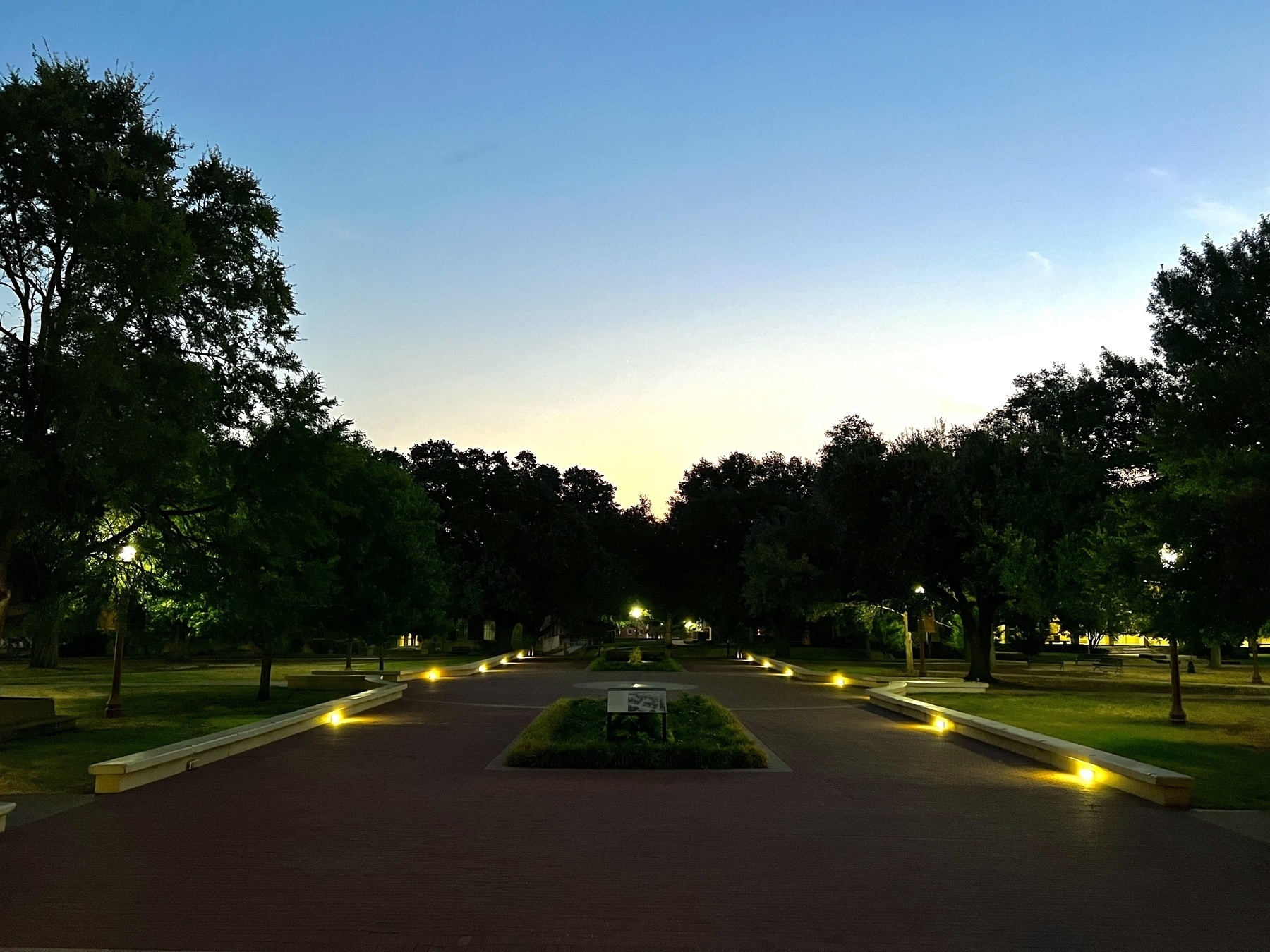
St. John Chrysostom: “Has [Eutropius] inflicted great wrongs and insults on you? I will not deny it. Yet this is the season not for judgment but for mercy; not for requiring an account, but for showing loving-kindness; not for investigating claims but for conceding them; not for verdicts and vengeance, but for mercy and favor. Let no one then be irritated or vexed, but let us rather beseech the merciful God to grant him a respite from death, and to rescue him from this impending destruction, so that he may put off his transgression, and let us unite to approach the merciful emperor, beseeching him for the sake of the church, for the sake of the altar, to concede the life of one man. … God says, ‘I will have mercy and not sacrifice,’ and throughout the scriptures you find him always enquiring after this, and declaring it to be the means of release from sin.”
Re: my Asteroid City post: I’m gonna write a long essay one day about how Terrence Malick and Anderson are matter and anti-matter: two Texas Episcopalians with diametrically opposing ideas of what movies can and should do. Earnestness vs. irony, fluidity vs. geometry, directness vs. endless indirection, etc.

Abandoned reading: Bob Dylan: The Essential Interviews by Jonathan Cott. Dylan, the greatest singer-songwriter ever, is a terrible interviewee because … well, to put it bluntly, because he lies all the time. You can’t trust anything he says. 📚
A Visit to Balzac’s House: “In addition to its garden, the Maison de Balzac boasts a large lawn of natural grass, unevenly tufted. No one seemed to be taking advantage of it, and eventually I noticed a series of pale green signs posted here and there at foot level, on each of which was written, in a looping white script, ‘Pelouse au repos.’ I googled it, and learned that the lawn was resting.”
I wrote a pretty long post about Asteroid City — but it has so many spoilers that you probably shouldn’t read it unless (a) you’ve seen the movie or (b) plan never to see the movie.
what the bird said

Many spoilers follow.
Wes Anderson’s Asteroid City begins with a framing story: We seem to be watching a television show from the 1950s, and in that show our Host — something like the Stage Manager from Our Town — presents to us a new play called Asteroid City. From time to time we return to this framing story, in which we learn (in nonconsecutive order) how a playwright named Conrad Earp came up with the idea for his play, how the play was cast, how changes were made to it, how its director came to live backstage amid the props, and so on. We’re even told that the playwright died in an accident.

The play itself is presented to us in full color, featuring a slightly more-pastel-than-usual version of the typical Wes Anderson color palette. Though, as noted above, there is a backstage, and at one point we even see an actor leave the scene he’s playing to go backstage and ask the director whether he’s playing his part properly, the moment we’re placed within the world of the play we’re given a 360º camera rotation — in 90º increments: quarter-turn, stop; quarter-turn, stop; etc. — to demonstrate that the play’s world completely surrounds us, that for us there should not be, cannot be, any “backstage.”
Here’s what happens. It’s 1955. Many people converge on a meteor crater in the desert somewhere near the convergence of California, Arizona, and Nevada. Some teenage student scientists, along with their parents, have come to receive awards (from a general in the U.S. Army) for their inventions; a busload of younger students are there on a field trip; a country-and-western band get stuck when they miss their bus out of town. (Or “town” — the population is 87.) In the middle of the award ceremony a spaceship arrives and hovers over the crater; an alien descends from the ship and takes a basketball-sized chunk of the meteorite; the government confines everyone to the site for a week and forbids communication with the outside world. Tentative romantic relationships begin. One of the teenage scientists manages to get word out to his high-school newspaper; with the information embargo broken, the government decides to let everyone go home; before everyone can leave the spaceship returns to drop off the meteorite; the general re-imposes lockdown; chaotic resistance ensues; the actor has his motivational crisis and goes backstage; the lockdown is lifted; everyone goes home. So it’s a comedy, basically.
Or not. Many of Wes Anderson’s movies are tonally awkward, and this one more than most. The awkwardness here arises from one major plot point that I have omitted. That actor who has a crisis about his motivations? He’s playing a photojournalist named Augie Steenbeck … hang on. Let’s pause a moment to pursue clarity. You’ll see a lot of commentary on this movie saying that Jason Schwartzman plays Augie Steenbeck. This is not true. In the movie Asteroid City Jason Schwartzman portrays an actor named Jones Hall who, in the play Asteroid City, portrays a photojournalist named Augie Steenbeck who visits a town called Asteroid City. All clear now? Okay.
Well … perhaps I should add that, depending on how you understand this TV-show framing, it’s possible that Jason Schwartzman is playing an unnamed actor who, for the purposes of television, is playing the stage actor Jones Hall, who plays the photojournalist Augie Steenbeck. But let’s pretend I didn’t say that.
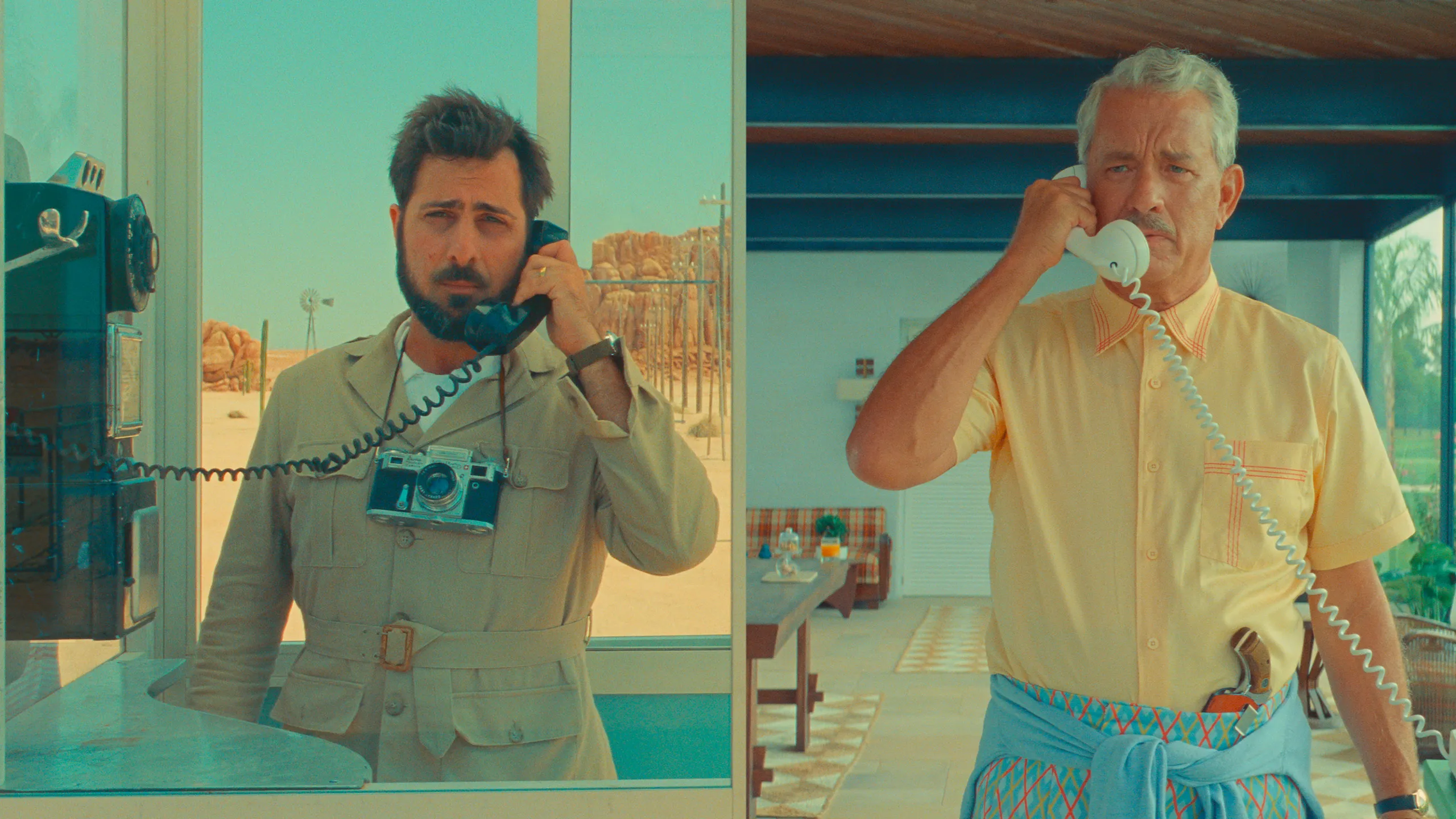
Augie Steenbeck has come to Asteroid City because his son Woodrow is one of the teenage scientists to be honored. He brings Woodrow and also his three younger daughters. He has a big problem, though: his wife, the mother of his four children, has been dead for three weeks and he hasn’t told them. Now, under pressure from his father-in-law, whom he talks to on the phone, he decides to tell them — and does, in the flat tones that all of Wes Anderson’s characters typically use, while holding her ashes in a Tupperware container.

Jones Hall, the actor playing Augie, doesn’t understand Augie. He’s doesn’t know what’s going on his Augie’s head — that emotionless flatness of tone hides Augie from the man performing him. He’s also confused about some of Augie’s actions, especially one odd thing: after he convinces Conrad Earp to cast him as Augie, he asks “Why does Augie burn his hand on the Quickie Griddle?” (Quickie Griddle pictured above, at the bottom of the frame. Augie is just about to touch it.) Augie has toasted a sandwich, and when talking to the woman he may be falling for, he suddenly places his palm on the hot griddle. But Conrad Earp doesn’t know why Augie does that: “He just sort of did it while I was typing.” Hall’s ongoing puzzlement about Augie then takes him backstage to talk to the director. “I still don’t understand the play,” he says. “Doesn’t matter,” the director replies. “Just keep telling the story.”
Hall is not satisfied. The big chaotic scene of resistance to the general’s diktat is still going on, and he doesn’t think he’ll be missed if he stays away a few moments longer. “I need some fresh air,” he says, to which the director replies, “You won’t find any.” But Augie goes out on the fire escape anyway and lights a cigarette.
•
Think of a movie like The Grand Budapest Hotel. How might one defend treating a subject like the Bloodlands of the mid-twentieth century in this peculiar way, with its chocolate-box colors, farcical action, exaggerated and anti-naturalistic acting styles? Asteroid City is, I think, Wes Anderson’s attempt to answer that question. That’s what I’m slowly getting around to explaining.
•

We primarily see Augie interacting with Midge, the woman he may be falling for, as they look at each other across the gap that separates his tiny motel cottage from hers. Each of them is framed for the other; they speak but are separated by the walls. And now, when Jones Hall goes out onto the fire escape, he finds himself immediately opposite another fire escape, one attached to another theater, and he is looking at another actor, another person who has left the theatrical space for some fresh air and a smoke — and it’s a person he recognizes. “Ah,” he says, it’s you, the wife who played my actress.” The inadvertent switch of nouns is of course telling.
In some earlier version of the play Asteroid City Conrad Earp had written a scene between Augie and his wife, a scene in which she advises him how to navigate his life without her. Jones Hall has forgotten the scene, but “the wife who played his actress” remembers it word for word, and quietly recites it to him as they look at each other across their respective fire-escape platforms. Jones Hall has traveled from the brightly-colored environment of Asteroid City to the disorderly backstage collection of props and makeup to what is for him the “real world” — the world of “fresh air.” Was the director wrong to tell him he wouldn’t find any?
What’s the opposite of “fresh”? One opposite is artificial, and it’s noteworthy that the actress who recites her discarded lines, her discarded part, is dressed for a period drama, wearing the rococo costume of a seventeenth-century aristocrat. Jones Hall learns something he needs to know about his character not through inhaling fresh air, not through re-entering the “real world,” but through a chance encounter with words of explanation, words rejected because they were too explicit, because they said too much — and delivered to him by a Goddess of Contrivance, the very embodiment of artifice.

Again, this is all part of the frame story, and the final part part of the frame story involves a flashback to a visit paid by Conrad Earp to a place very like the Actors Studio, an institution created in the very period in which our story is set. There Conrad Earp and the movie’s equivalent of Lee Strasberg encourage the actors gathered there — several of whom eventually make up the main body of the cast of the play Asteroid City — to “workshop” the dialogue of the play. Some of them enter, or feign to enter, a kind of trance state, in the midst of which the camera closes in on Jones Hall, who looks directly at us and says a single sentence, a sentence then taken up and chanted by the whole room: “You can’t wake up if you don’t fall asleep.”
You can’t wake up if you don’t fall asleep. I think this is as close as Wes Anderson has ever come to explaining and defending his very peculiar style of filmmaking. What he’s telling us is that the most vital and the most painful things in life cannot be confronted directly, explicitly, artlessly. There must be masks — contrivances, artifice — that distract us, lull us, distract our agitated minds. As Touchstone says, “The truest poetry is the most feigning.” Tragic experience, to be properly worked through, must wear the mask of comedy. And perhaps for the deepest griefs a single mask is insufficient; you may need several. So here we see layer after layer being peeled away, but no matter how many layers we remove we just find more artifice.
And I think this is Anderson saying that he wants to make art about some of the most profound of human experiences — but doesn’t know how to make it explicitly and directly about those experiences. Or doesn’t want to. Or doesn’t believe in doing so. In some ways, then, you can see this movie as a kind of a commentary on his other films, above all, I think, The Grand Budapest Hotel. If you want to know why Wes Anderson takes such a mannered and apparently frivolous attitude towards matters of the greatest depth and significance, I think he’s explaining that in Asteroid City. He’s obeying Emily Dickinson’s instruction to “Tell the truth but tell it slant.” And he’s doing that because, as the bird says, “human kind / Cannot bear very much reality.”

Oh, is that what he embodies?

Cory Doctorow: “ In the Big Tech internet, it’s freedom for them, openness for us. ‘Openness’ – transparency, reusability and extensibility – is valuable, but it shouldn’t be mistaken for technological self-determination. As the tech sector becomes ever-more concentrated, the limits of openness become more apparent.”
Last night I dreamed that Leo Messi lived near me and out of neighborliness did some work in my yard. I determined to pay him, but he said he didn’t use Venmo, so I wrote him a check. I figured that he probably wouldn’t cash it, since he doesn’t need the $, but it was the right thing to do.
Chris Arnade: “I’ve also become more convinced that while all suburban bleh might look the same, might seem boring and banal, there is a lot going on in it, because people are always more interesting than their surroundings.”
I wrote a post about the wonderful artist Tirzah Garwood.
Tirzah Garwood
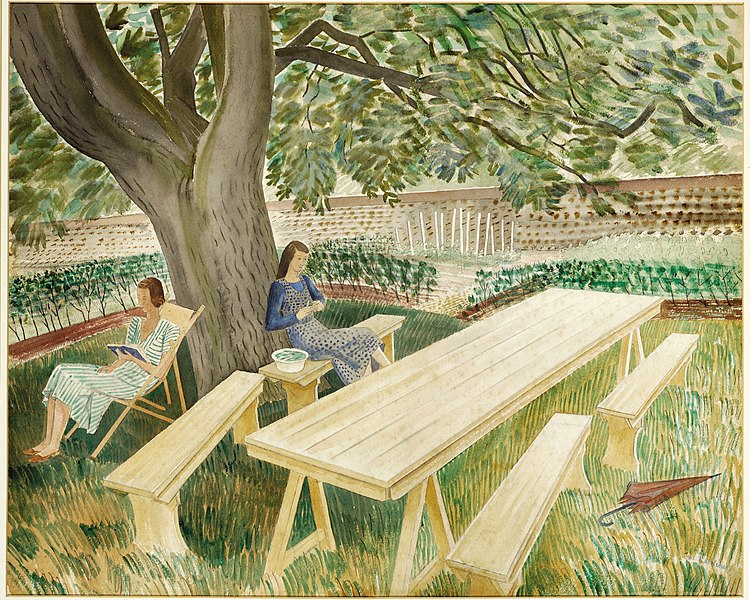
Regular readers of this will know of my fondness for the art of Eric Ravilious. Ravilious was married to another highly gifted artist, Tirzah Garwood, whose work I have posted a couple of times; but she deserves more attention than I have given her. (In the Ravilious painting above, that’s her on the right, accompanied by her friend Charlotte Bawden. I will write at some point later about the Bawdens, Charlotte and Edward.) Here they are together:

Here’s something of a self-portrait:
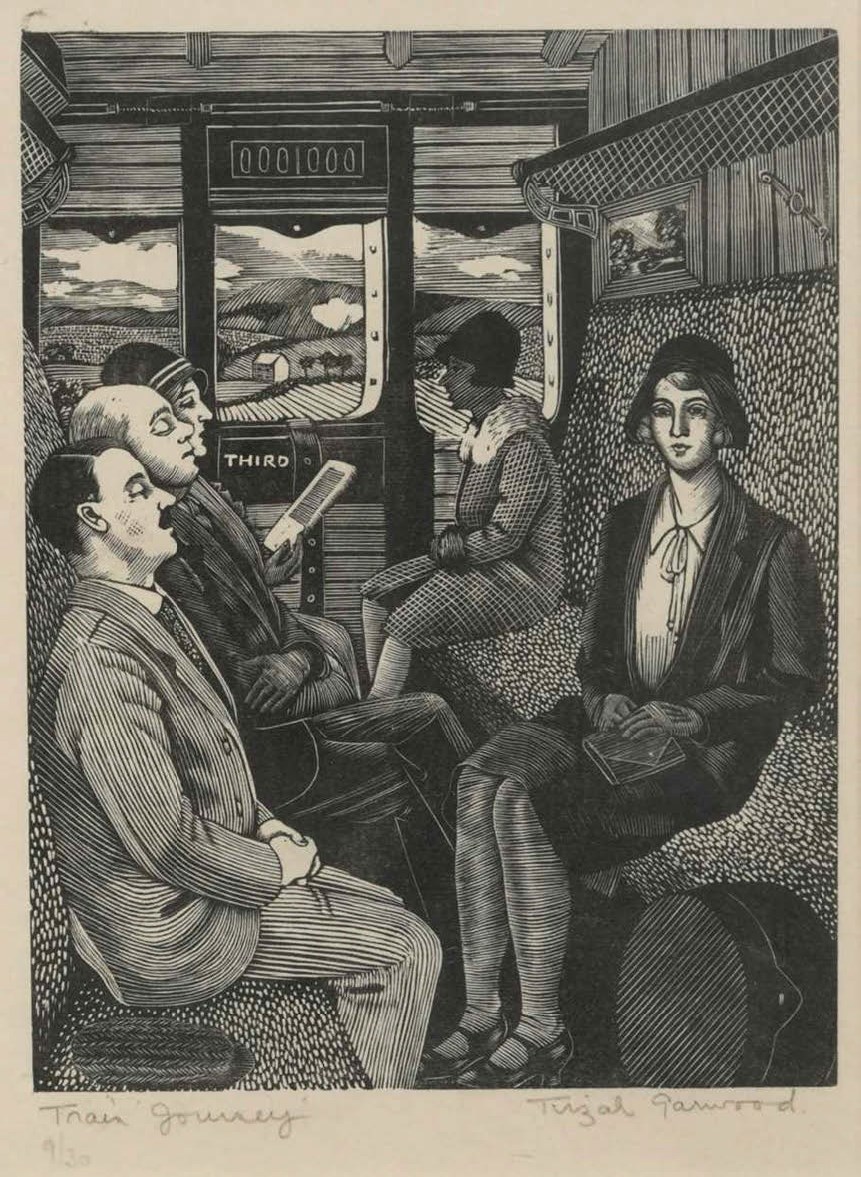
(Compare Ravilious’s “Train Landscape.”) Garwood worked in several media, and when you look at the image below you’ll wish she had done more in that curious medium, embroidery.

(Also perhaps a bit of a self-portrait?) Larger version here.

Alas, neither Eric nor Tirzah were blessed with long life. In the Second World War Eric was an official “War Artist,” and in August 1942 his plane was lost somewhere over Iceland. He was 39. Tirzah suffered from recurrent cancer and died in 1951 at the age of 42. Their three children survived them, and their youngest, Anne Ullmann (born 1941), still celebrates and advocates for her parents’ work.
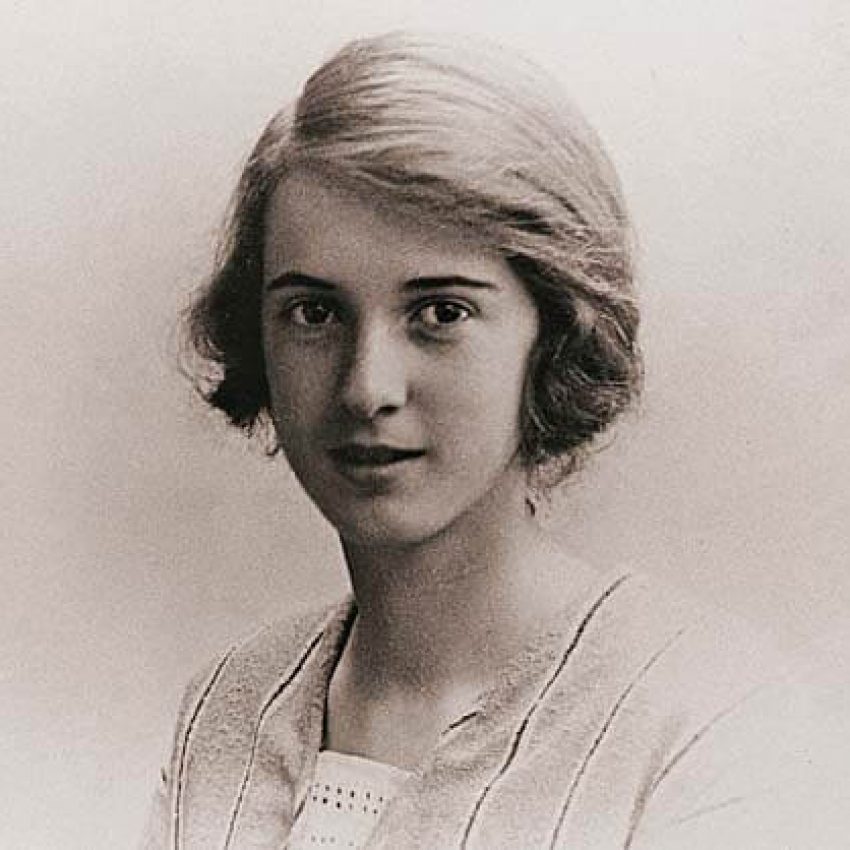
In my early years I was utterly devoted to Ace Doubles, which bound two short novels back-to-back — you’d read one, then flip it over and read the other. The great SF editor Terry Carr once said that Ace would publish the Bible as a Double: War God of Israel and The Thing with Three Souls.
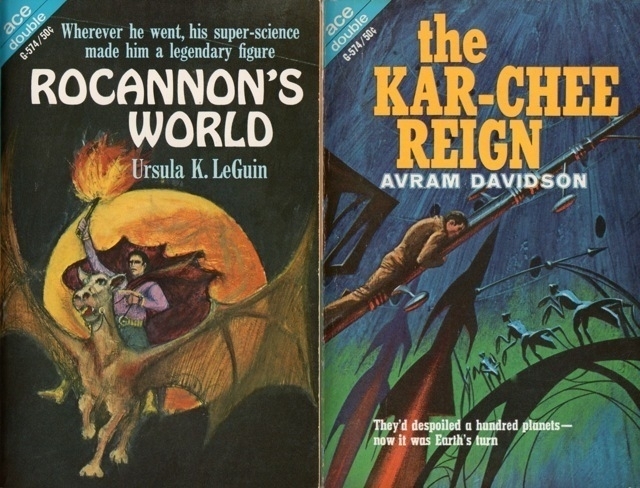
I have an essay, “Looking Westward,” in the new issue of Raritan. (Paywalled; sorry about that.) It concerns water, Wallace Stegner, the 100th meridian, and where the West begins.


